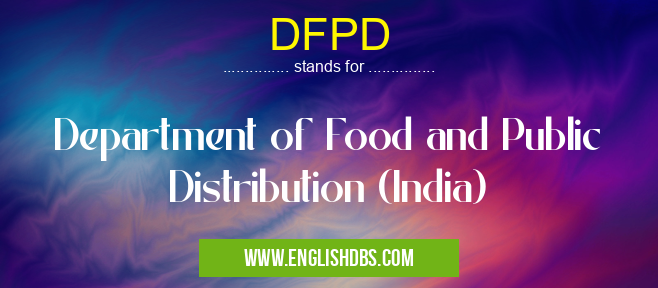What does DFPD mean in FOOD & NUTRITION
DFPD stands for Department of Food and Public Distribution. It is a department under the Ministry of Consumer Affairs, Food and Public Distribution of the Government of India. DFPD is responsible for ensuring food security in the country by implementing various food-related schemes and policies.

DFPD meaning in Food & Nutrition in Miscellaneous
DFPD mostly used in an acronym Food & Nutrition in Category Miscellaneous that means Department of Food and Public Distribution (India)
Shorthand: DFPD,
Full Form: Department of Food and Public Distribution (India)
For more information of "Department of Food and Public Distribution (India)", see the section below.
Functions of DFPD
-
Food Security Schemes:
- Public Distribution System (PDS): Provides subsidized food grains to eligible households.
- National Food Security Act (NFSA): Ensures food security for the most vulnerable sections of the population.
- Antyodaya Anna Yojana (AAY): Provides free food grains to the poorest households.
-
Food Logistics and Storage:
- Manages the procurement, storage, and distribution of food grains through a network of Food Corporation of India (FCI) godowns.
- Ensures the availability of food grains in all parts of the country.
-
Price Stabilization:
- Intervenes in the market to stabilize prices of essential commodities like pulses, edible oils, and sugar.
- Implements schemes such as the Price Stabilization Fund (PSF) to mitigate price volatility.
-
Consumer Protection:
- Regulates the quality of food products by setting standards and enforcing regulations.
- Protects consumers from adulteration and other food safety issues.
-
Policy Formulation:
- Develops and implements policies related to food security, public distribution, and consumer protection.
- Works with state governments and other stakeholders to address food-related issues.
Essential Questions and Answers on Department of Food and Public Distribution (India) in "MISCELLANEOUS»FOOD"
What is the Department of Food and Public Distribution (DFPD)?
The Department of Food and Public Distribution (DFPD) is a department within the Ministry of Consumer Affairs, Food and Public Distribution of the Indian government. It is responsible for formulating and implementing policies related to food security and public distribution in the country.
What are the main functions of the DFPD?
The main functions of the DFPD include:
- Managing the National Food Security Act, 2013, which provides subsidized food grains to economically disadvantaged households.
- Operating the Targeted Public Distribution System (TPDS), which distributes food grains to eligible households through a network of fair price shops.
- Implementing the Pradhan Mantri Garib Kalyan Anna Yojana (PMGKAY), which provides additional food grains to TPDS beneficiaries during emergencies and crises.
- Managing the Food Corporation of India (FCI), which is responsible for procuring, storing, and distributing food grains.
What are the objectives of the DFPD?
The DFPD aims to:
- Ensure food security for all citizens by providing subsidized food grains to eligible households.
- Stabilize food prices and prevent hoarding and black marketing.
- Promote equitable distribution of food grains and prevent regional imbalances.
- Support farmers and protect their interests.
How can I apply for subsidized food grains under the TPDS?
To apply for subsidized food grains under the TPDS, you need to visit your nearest fair price shop and submit an application form along with the required documents, such as your Aadhaar card and ration card. Your eligibility will be determined based on your income and household size.
What are the benefits of the PMGKAY scheme?
The PMGKAY scheme provides additional food grains to TPDS beneficiaries free of cost. It helps to reduce food insecurity and alleviate hunger, especially during emergencies and crises.
Final Words: DFPD is a crucial department that plays a vital role in ensuring food security and protecting consumers in India. The department's efforts in implementing various food security schemes, managing food logistics, and regulating food quality contribute significantly to the well-being of the nation.
